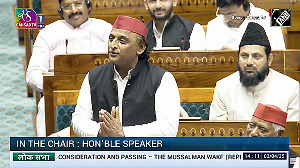External Affairs Minister S M Krishna on Sunday met the Egyptian leadership and established first contacts with the Muslim Brotherhood that is set to dominate the post-Mubarak political landscape of the country.
On a three-day visit to Egypt, the first by a senior Indian leader after last year's revolution, Krishna met the head of current military-led government, Field Marshal Mohamed Hussein Tantawi, Prime Minister Kamal Al Ganzhoury as well as his counterpart Mohamed Kamel Amr.
Krishna thanked Tantawi for the "extraordinary cooperation" extended by Egypt in evacuating more than 3,000 Indians from eastern Libya last year, and the protection extended to major Indian investment projects during the unrest.
However, the most significant meeting was with Mohamed Morsy, the leader of the Muslim Brotherhood's political arm the Freedom and Justice Party, that has emerged as the largest force in the first post-Mubarak Egyptian parliament.
With the Brotherhood appearing set to dominate the political landscape of Egypt, Krishna's meeting with its political wing's leader can be seen as part of efforts to achieve a smooth transition in ties with the new dispensation in the country.
While India had fair ties with the Mubarak-era regime, the meeting with Morsy would help Krishna understand the expectations of the Islamists-led new political regime that is now expected to hold sway over the country's policies.
On his part, Morsy told Krishna that India is "a very important friend" of Egypt and "can play a major role in the future".
"Egypt is facing major economic crisis and India should help the Egyptian people," he told Krishna when he called on him.
The Freedom and Justice Party emerged as the largest party winning 235 of the 498 seats in the Egyptian parliament in what many term the first free and fair election in the country.
Prime Minister Al Ganzoury said Egypt was keen to enhance trade cooperation with India.
Krishna and his counterpart also signed several agreements, including an MoU on cooperation in the field of environment protection, cultural exchange programme for the next three years and a work plan for agricultural cooperation.
An MoU was also inked between Egyptian Organisation for Standardisation and Bureau of Indian Standards after the two foreign ministers chaired the sixth session of Egypt-India Joint Commission Meeting.
"We reviewed the entire gamut of our bilateral relations during the just concluded Joint Commission Meeting... India has always viewed Egypt as a stabilising factor in the region and in the world," Krishna told the media at a joint press conference.
He said the two ministers accepted recommendations of four sub-committees on trade and economic cooperation, scientific and technical cooperation, cultural cooperation and information technology on strengthening bilateral relations in these sectors.
"India-Egypt relations are over five millennium years old. Egypt has consistently played a vital role in the Non Aligned Movement and championed the cause of the developing world. Our bilateral relations constitute a factor of peace and stability in international relations," said Krishna after signing of agreements between India and Egypt.
He said he welcomed the Egyptian prime minister's proposal that a multi-sectoral Indian delegation with representatives from both private and public sectors visit Egypt to focus on concrete areas of economic cooperation.
"(I have) requested the Egyptian side to identify specific sectors of their interest so that we can take the proposal forward," Krishna said.
During his visit here, Krishna also met Arab League Secretary General Nabil El Araby.
"Arab world and India share civilisational links, common cultural values and political beliefs and enjoy strong economic ties. With these activities, we propose to strengthen India-Arab cooperation further," Krishna said.
He said Indian investment of $2.5 billion is generating employment for 30,000 Egyptians, and pointed out that none of the Indian companies who had invested in Egypt have left the country after the Revolution.
"In fact, one more Indian factory has been established in Ain Sukhna," he said.










 © 2025
© 2025